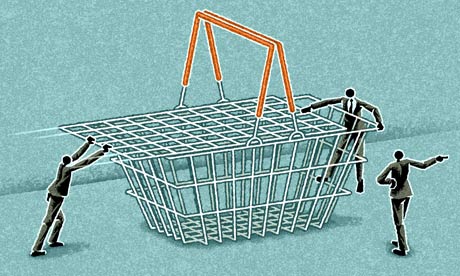By making some people on benefits use vouchers instead of cash, Conservatives are creating a true underclass

Illustration by Matt Kenyon
Back in January, a report came out arguing for benefits to be loaded on to a prepaid card rather than paid in cash. "It opens up the potential," the thinktank Demos concluded, "to exercise some control over how benefits are spent." Indeed it does: the MP Alec Shelbrooke, who might be the least pleasant Tory you've never heard of, had already put forward this idea, of finding some way to ensure that benefits couldn't be spent on "non-essential, desirable or damaging (Nedd) items".
At the time, it seemed like such obvious nonsense, such blatant, corporate-sponsored poor-bashing that I didn't wonder how near it would get to an actual policy. Shelbrooke was a bit-player in that classic Tory stunt of sending out the village idiot to punch some room on the right, so that the mainstream could shuffle closer to Ukip.
Less than two months later, the idea resurfaces as real life; the social fund, which gives out crisis loans, normally of around £50, is to be scrapped. The money's going to councils, but not ringfenced. Most local authorities are going to deliver it by voucher, on a prepaid card – you can only spend it on food, and in some areas, only in certain shops. One council's voucher is only redeemable in Asda, which is handy if you live near an Asda. There are councils that are cutting out the middleman – commerce – and giving the money straight to a foodbank charity.
For the sake of this pitiful amount of money – on average, councils had around 7,000 claims a year – a fundamental principle has been upturned. Your government still upholds your right, as a citizen, not to starve (well, generally speaking – there is one council planning to peg even the crisis loan to "behaviour"); it no longer upholds your right to public money. Indeed, the figures at stake here are so small, and the principle so fundamental, that I won't be surprised at all when we discover that, due to outsourcing and administrative error, it winds up costing more than it did before. Money isn't the point; cruelty is the point.
Replacing cash with vouchers has a number of damaging effects. First, it's infantilising. Crisis loans delivered this way take on the shape of pocket money or charity. Second, it's stigmatising, as asylum seekers on the Azure card often point out – people don't want strangers to be able to make judgments about what they're buying, and whether they should be buying it. People want privacy in their financial transactions. Call them crazy. Third, it erodes the idea that the public purse is something we all created together and, in a crisis, are entitled to draw on it. Yes, I'm talking about a culture of entitlement – culture is a culture of entitlement. Modern civilisation is built upon pooling resources and being entitled to a share in them.
The right wing is obsessed with the poor being able to afford to smoke and drink, and nowhere is their hostility clearer than when you get them on the subject of the Sky+ package. But I've wasted enough of my life arguing about this fanciful portrait, the family on jobseeker's allowance who can afford a satellite package, which then rivets them to the telly, leaving them unable to apply for any of the plentiful jobs available.
It's straightforward – with benefits as low as they are and food and fuel prices as high, anyone who could afford to smoke and drink would be starving. You just have to look at Sky's audience share to see that almost nobody is watching it, underclass or otherwise.
I see those pragmatic arguments now as a Maginot line, and food stamps marched in over the undefended territory of human dignity. When you relegate people to a world outside money, you create a true underclass: a group of people whose privacy and autonomy are worth less than everyone else's, who are stateless in a world made of shops.
Twitter: @zoesqwilliams